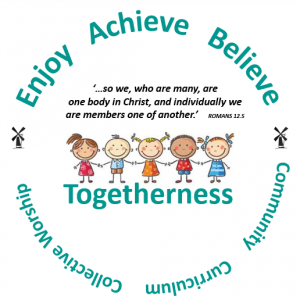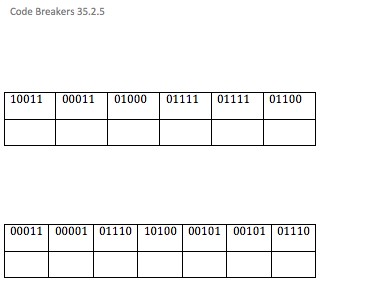Vision, Values and our Logo
On this page, you will learn about our school vision and its associated values. You can also find out why we have a windmill as our school logo!
Our vision:
To serve our community and provide a welcoming atmosphere where the spirit of togetherness flows throughout. Where all members have the same care for one another, share a love of learning and instil a ‘can do’ culture. We desire that all our children fulfil their potential and enter their next phase of education as confident, knowledgeable and well-rounded individuals.
Our vision is affiliated to these three words: Enjoy. Achieve. Believe. These words describe our ambition for anyone who joins our school community and becomes a member of Team Thurton.
ENJOY:
- Members benefit and enjoy activities and occasions individually and collectively
“If Danes were to search for the happiest school in the world, Thurton CE Primary would surely be in the top 10!” Parent
ACHIEVE:
- Members achieve their goals through individual effort, teamwork and courage
“We do our best to ensure our children can do their best.” Staff member
BELIEVE:
- Members encounter the Christian faith and its values
- Members develop their knowledge and understandings of other world religions
- Members believe in their own capabilities and those of others
“All things are possible for one who believes.” Jesus
“Immersed in a ‘can-do culture’, nothing is seen by pupils or teaching staff as a potential barrier to successful learning.” Linda Killman, HMI
Our core value is Togetherness.
We actively promote a Team Thurton spirit throughout our school community. By showing and living by the value of Togetherness, our thinking, our behaviour and our decision making is guided towards achieving our Vision. “Leaders never lose sight of Thurton’s core values for every pupil to ‘Enjoy, Achieve, Believe’ when making changes.” Linda Killman, HMI
Both our vision and our associated values are grounded in a clear theology firmly rooted in a Christian narrative from the New Testament of the Bible. Paul the Apostle, in his letters to the Churches in Corinth and Rome, writes about the unity of the members of Christ in one body. As a school community, we are One Body with Many Members. School Leaders know the importance of having a clear understanding of what our values are and of what St Paul explains in his verse, as they give our school both direction and purpose.
‘…so we, who are many, are one body in Christ, and individually we are members one of another.’ Romans 12:5
‘For just as the body is one and has many members, and all the members of the body, though many, are one body, so it is with Christ. Indeed, the body does not consist of one member but of many. If the foot would say, “Because I am not a hand, I do not belong to the body,” that would not make it any less a part of the body. And if the ear would say, “Because I am not an eye, I do not belong to the body,” that would not make it any less a part of the body. If the whole body were an eye, where would the hearing be? If the whole body were hearing, where would the sense of smell be? But as it is, God arranged the members in the body, each one of them, as he chose. If all were a single member, where would the body be? As it is, there are many members, yet one body. The eye cannot say to the hand, “I have no need of you,” nor again the head to the feet, “I have no need of you.” On the contrary, the members of the body that seem to be weaker are indispensable, and those members of the body that we think less honourable we clothe with greater honour, and our less respectable members are treated with greater respect; whereas our more respectable members do not need this. But God has so arranged the body, giving the greater honour to the inferior member, that there may be no dissension within the body, but the members may have the same care for one another. If one member suffers, all suffer together with it; if one member is honoured, all rejoice together with it.’ 1 Corinthians 12:12-26
Some examples of how we live these words out in school life:
- Our intent and implementation of our curriculum and how it evolves over time: https://thurton.norfolk.sch.uk/wp-content/uploads/2014/01/How-our-curriculum-is-planned.pdf
- Our school motto: do our best, be our best and try our best
- Our Celebration Assembly
- Our School Priorities: Developing Learning Pathways in: Speech and Language – Phonics/Reading – Number – Writing – to enable all pupils, particularly the most disadvantaged or those with SEND, to progress well and achieve the best possible outcomes.
- Our Behaviour Policy
- Our continued focus on engaging with and completing appropriate staff training

